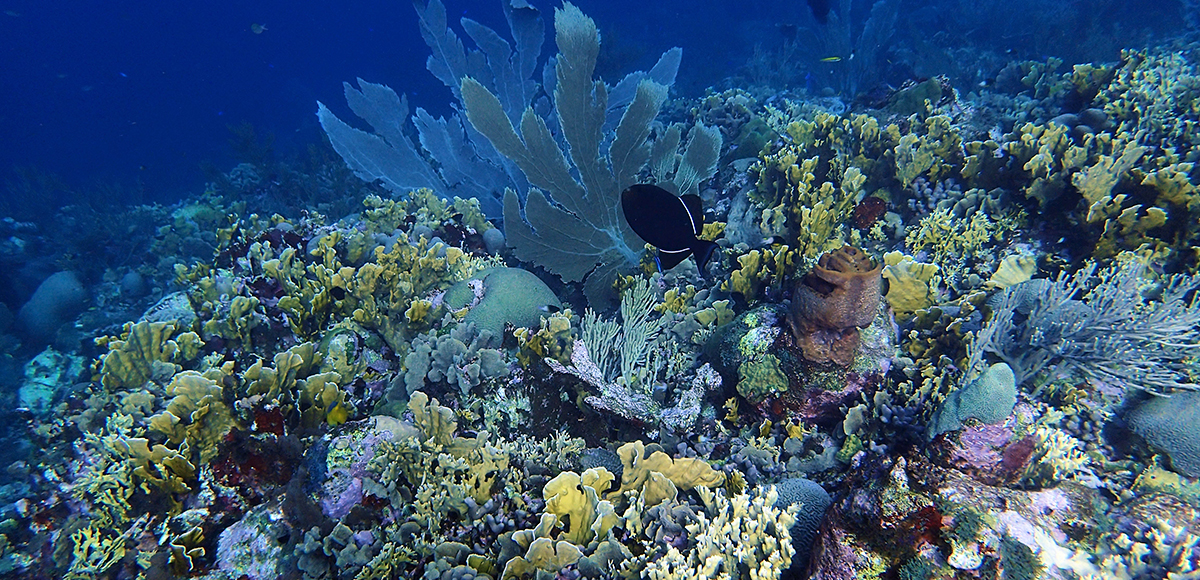
Microbes that act as intermediaries between coral and algae can hurt coral health, similar to gut microbes that alter human health.
By Padma Nagappan
Climate change and environmental stressors are not the only threats for coral reefs worldwide. Overfishing allows other reef organisms such as algae to crowd out corals.
This has a snowball effect that alters the battlefield corals face. The threat at the front lines actually becomes microscopic in scale, from bacteria that feed on the algae and accumulate on reefs.
Under duress, many reefs formerly dominated by coral are shifting to systems dominated by turf and fleshy algae.
Ecologists at San Diego State University, working with collaborators in the U.S and Europe, found the outcome of the competition between corals and turf algae is determined by the combination of microbes at the intersection where the contenders meet.
All plants and animals are associated with communities of viruses and microbes—their microbiome—that interact via a suite of chemicals produced by their metabolism, termed metabolites. The new study, published June 1 in PNAS, investigated the role of each component, host organisms, viruses, bacteria, and metabolites that contribute to coral–turf algal interactions.
“We found that when coral interacts with turf algae on a reef, there is a unique chemical and bacterial community that forms at the interface between these two organisms, an emergent microbiome,” said Ty Roach, co-lead author who was a doctoral candidate at the time of the study in 2018-19. “This interface community is made up of larger bacterial cells that use energy at a faster rate. Our data suggest that this change in bacterial size and energy use, which can negatively affect coral, is driven by a change in which types of bacteria dominate the microbiome.”
The researchers, led by SDSU viral ecologist Forest Rohwer, gathered data on genes, proteins and metabolic products associated with corals and algae on a reef, and directly looked at the bacteria and viruses under a microscope.
“Our chemical analysis indicates this change is driven by bacteria that feed on algal-derived biochemicals,” said co-lead author Mark Little, a doctoral candidate at SDSU. “Interestingly, these changes in bacterial groups and their energy use, which comes from feeding on specific chemicals, are similar to changes seen in the human gut, with dominant bacteria linked to obesity.”
Coral reefs are valued for their cultural and ecological importance, providing protection against storms and waves, and serve as reservoirs of biodiversity. Restoring coral cover and building reef resilience provides the foundation essential to a functional and healthy reef ecosystem, which is critical for the surrounding community.
“This highlights the fact that many ecological interactions between organisms are actually mediated by viruses and bacteria,” said Rohwer, biology professor and senior author of the study. “This provides opportunities to engineer probiotics to alleviate the effects of stressors on corals.”
The research team plans to use the insight gained from this study to design and test probiotic blends for use on corals. Their goal is to apply personalized medicine techniques to help corals gain an ecological advantage over competitors such as harmful algae.
The SDSU team worked with metabolomics expert Pieter Dorrestein at the University of California, San Diego, and researchers from the University of Amsterdam and the Royal Netherlands Institute for Sea Research. Roach is now a post-doctoral researcher at the University of Hawai’i at Manoa, with the Hawai’i Institute of Marine Biology. The project was funded by the National Science Foundation.